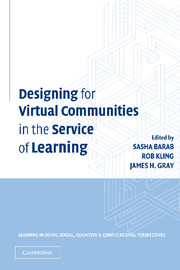Book contents
- Frontmatter
- Contents
- List of Contributors
- Series Foreword
- Foreword
- Preface and Acknowledgments
- In Memoriam
- PART I COMING TO TERMS WITH COMMUNITY
- PART II DESIGNING FOR WEB-SUPPORTED COMMUNITY
- PART III FOSTERING COMMUNITY/MEMBER PARTICIPATION
- PART IV RESEARCHING ONLINE COMMUNITY
- 11 Scholarly Networks as Learning Communities
- 12 Computer-Mediated Discourse Analysis
- 13 Shared “We” and Shared “They” Indicators of Group Identity in Online Teacher Professional Development
- 14 Sociocultural Analysis of Online Professional Development
- Index
- Titles in the series
- References
14 - Sociocultural Analysis of Online Professional Development
A Case Study of Personal, Interpersonal, Community, and Technical Aspects
Published online by Cambridge University Press: 05 June 2012
- Frontmatter
- Contents
- List of Contributors
- Series Foreword
- Foreword
- Preface and Acknowledgments
- In Memoriam
- PART I COMING TO TERMS WITH COMMUNITY
- PART II DESIGNING FOR WEB-SUPPORTED COMMUNITY
- PART III FOSTERING COMMUNITY/MEMBER PARTICIPATION
- PART IV RESEARCHING ONLINE COMMUNITY
- 11 Scholarly Networks as Learning Communities
- 12 Computer-Mediated Discourse Analysis
- 13 Shared “We” and Shared “They” Indicators of Group Identity in Online Teacher Professional Development
- 14 Sociocultural Analysis of Online Professional Development
- Index
- Titles in the series
- References
Summary
Robert is from Iowa, now living in a small town near the Rhone river valley in central France with his French wife and two children. He teaches English as a foreign language in the local high school, where he has only a handful of colleagues who share his educational interests. He turned to the Internet five or six years ago to find “intelligent contact with English-speaking people.” More recently, he joined an email list about an online pedagogical approach called InternetInquiry. Then, while planning to lead local workshops on “teacher training in educational technology,” Robert joined Tapped In (http://www.tappedin.org) – a multi-user virtual environment (MUVE) designed to promote teacher professional development – and soon “fell in love” with the environment. By the time we interviewed him seven months later, he had designed his online office, attended more than forty seminars – including monthly sessions on the topic of InternetInquiry – and launched his own weekly seminar about language learning.
In this chapter, we describe and analyze Robert's experience in Tapped In and related changes in his professional practice. While his experience is not necessarily typical of participants in Tapped In or other online communities, the particular details of his activities illustrate issues common to many educators who seek to develop their professional practice through participation with colleagues in online communities.
- Type
- Chapter
- Information
- Designing for Virtual Communities in the Service of Learning , pp. 404 - 436Publisher: Cambridge University PressPrint publication year: 2004
References
- 8
- Cited by



